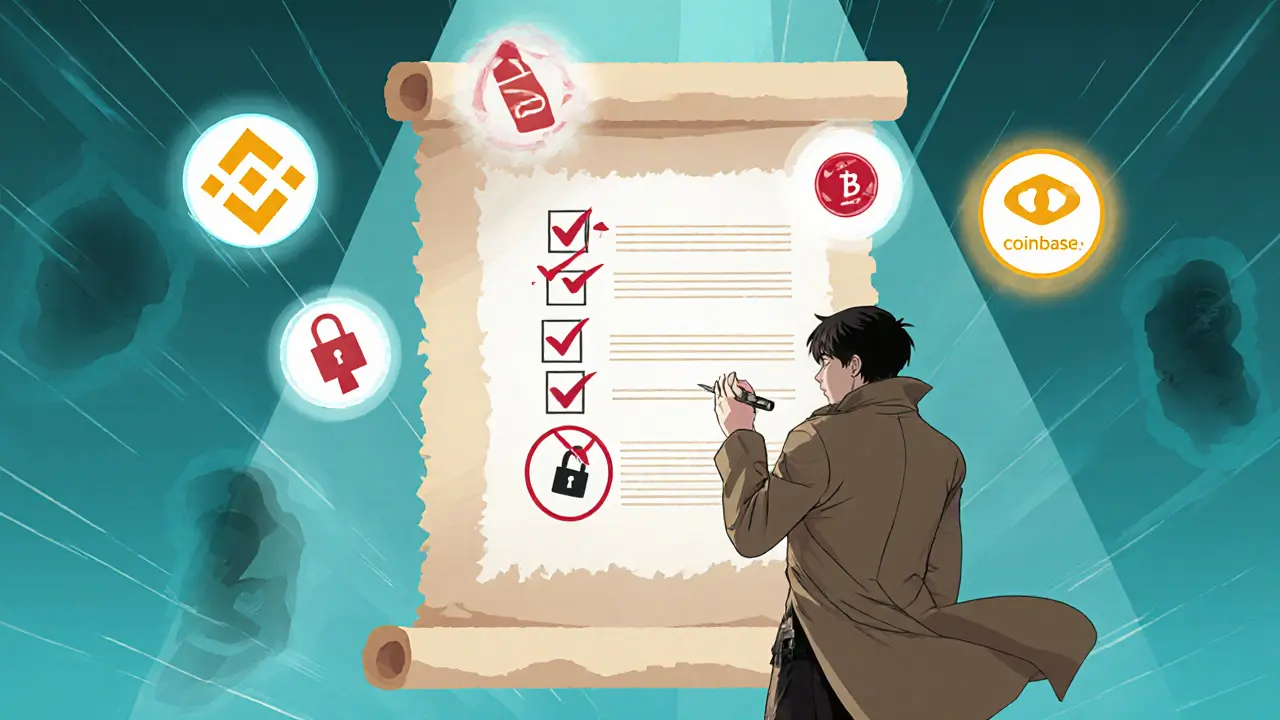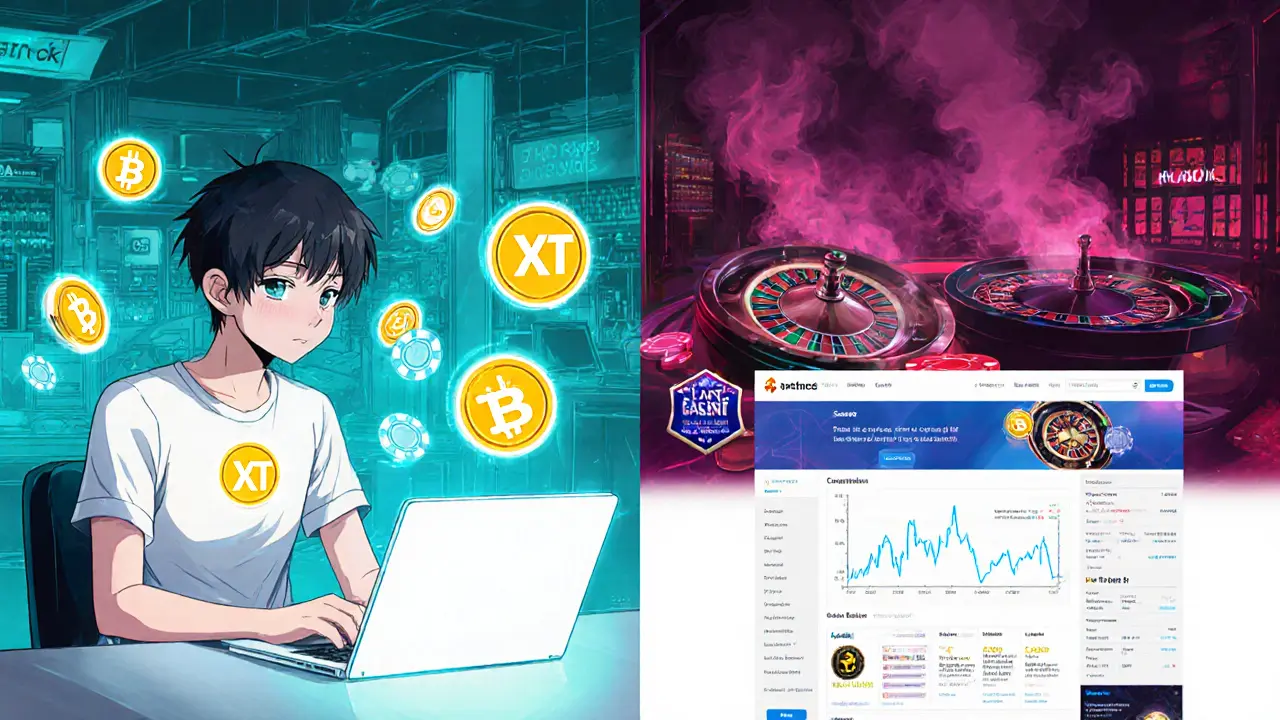ExtStock Crypto Exchange Checker
This tool helps you determine whether ExtStock functions as a legitimate cryptocurrency exchange by evaluating key attributes compared to established platforms.
ExtStock is primarily known as a token (XT) and a content site (extstock.com). It does not operate a public spot-trading exchange like Binance or Coinbase. This tool evaluates critical exchange attributes to help you assess the legitimacy of ExtStock claims.
- Founded Year Not Disclosed
- Supported Assets Primarily XT
- Trading Volume N/A
- Fee Schedule Not Published
- Security Measures Not Listed
- Regulatory Licenses Unclear
- Binance 2017
- Coinbase 2012
- Crypto.com 2016
- Supported Assets 5,000+ tokens
- 24h Trading Volume $30B+
- Typical Taker Fee 0.10% - 0.20%
- Lack of transparent ownership: No legal entity or registration details are posted.
- No published fee schedule: Without knowing what you’ll pay, you can’t calculate profitability.
- Absence of security disclosures: No mention of cold wallet percentages, insurance, or audits.
- Unclear regulatory standing: No jurisdiction, licence number, or KYC policy is visible.
- Limited market depth: XT trades on low-volume platforms, so slippage can be high.
Conclusion
Based on the lack of verifiable infrastructure, public data, and standard exchange metrics, ExtStock does not function as a conventional crypto exchange. It is recommended to use established exchanges for reliable trading services.
Verification Results
When you type ExtStock crypto exchange review into a search box, the results are a mix of a token, a gambling guide and a vague hint of an exchange. The confusion is real, and anyone looking to trade needs a clear picture before committing funds.
Key Takeaways
- ExtStock does not operate a public spot‑trading exchange like Binance or Coinbase.
- The brand primarily refers to ExtStock Token (XT), a tradable cryptocurrency listed on a few niche platforms.
- The website extstock.com focuses on reviewing crypto‑gambling sites, not on providing trading services.
- Because of limited transparency, users should treat ExtStock as a high‑risk offering and consider established exchanges for everyday trading.
- If you still want exposure to XT, verify liquidity, wallet security, and the regulatory stance of the platform you use.
What Is ExtStock?
At its core, ExtStock is a brand that appears in three distinct contexts:
- ExtStock Token (XT) - an ERC‑20 style cryptocurrency that can be bought and sold on smaller exchanges and via conversion services like Coinbase Australia.
- extstock.com - a content site that curates the "safest crypto casinos in the USA" and offers comparison charts for gambling platforms.
- A rumored crypto exchange that, despite the name, has never published the standard data points (fees, volume, regulatory licence) that any reputable exchange provides.
Understanding these layers is the first step to separating hype from a usable service.
Does ExtStock Operate as an Exchange?
Typical exchange reviews include details such as:
- Founded year and legal entity
- Supported trading pairs and daily volume
- Fee schedule (maker/taker, withdrawal)
- Security measures (cold storage, 2FA, insurance)
- Regulatory compliance (licenses, KYC policies)
For ExtStock, none of these metrics are publicly available. The brand’s own site never mentions order books, API access, or a user dashboard. Instead, it showcases gambling reviews and token price tickers.
Independent databases like CoinMarketCap and CoinGecko list XT as a token but do not list an "ExtStock Exchange" as a market venue. Even Coinbase only offers a conversion service for XT, not a dedicated exchange portal.
Given the lack of verifiable infrastructure, the safest conclusion is that ExtStock does **not** function as a conventional crypto exchange.

How Does ExtStock Stack Up Against Established Exchanges?
Below is a quick side‑by‑side look at the most common criteria investors use when picking a platform. The data for ExtStock is marked as "Not disclosed" because the information simply isn’t out there.
| Attribute | ExtStock (claimed) | Binance | Coinbase | Crypto.com Exchange |
|---|---|---|---|---|
| Founded | Not disclosed | 2017 | 2012 | 2016 |
| Supported assets | Primarily XT token | 5,000+ coins & tokens | 250+ coins & tokens | 250+ coins & tokens |
| 24‑h trading volume (USD) | N/A | $30B+ | $7B+ | $1B+ |
| Typical taker fee | N/A | 0.10% - 0.20% | 0.50% - 1.50% | 0.04% - 0.20% |
| Security features | Not publicly listed | Cold storage, SAFU fund, 2FA, biometrics | Cold storage, insurance, 2FA, device trust | Cold storage, 2FA, anti‑phishing code |
| Regulatory licences | Unclear | Multiple global licences | US, EU, UK licences | Cyprus, Singapore licences |
When you compare the concrete numbers from the big players with the blanks for ExtStock, the risk gap becomes obvious.
Red Flags and Risk Considerations
Every crypto trader should run a mental checklist. For ExtStock, the following items raise concern:
- Lack of transparent ownership. No legal entity or registration details are posted.
- No published fee schedule. Without knowing what you’ll pay, you can’t calculate profitability.
- Absence of security disclosures. No mention of cold wallet percentages, insurance, or audits.
- Unclear regulatory standing. No jurisdiction, licence number, or KYC policy is visible.
- Limited market depth. XT trades on low‑volume platforms, so slippage can be high.
These factors are why most seasoned traders steer clear of platforms that don’t publish the basics.
Who Might Still Want to Use ExtStock?
There are niche scenarios where a user could find value:
- Token collectors. If you specifically want XT for its speculative upside, you might trade it on a small exchange that lists the token.
- Crypto‑gamblers. Some users enjoy the gambling‑focused content on extstock.com and may sign up for affiliate programmes.
- Developers testing white‑label solutions. Companies could use ExtStock as a brand placeholder when building a custom exchange via providers like AlphaPoint, though no public evidence suggests this is happening.
Even in these cases, it’s wise to keep any exposure small and to use a reputable wallet for storage.
How to Verify Before You Trade
If you decide to explore XT or any service under the ExtStock banner, follow these steps:
- Check the domain’s SSL certificate and WHOIS registration date.
- Search for the token’s contract address on Etherscan; confirm it matches the one advertised on the platform.
- Look for third‑party audits or security reports - the absence of these is a red flag.
- Read user reviews on forums like Reddit, Bitcointalk, or Trustpilot. Note recurring complaints about withdrawals or support.
- Start with a minimal amount, preferably on a testnet or a demo account if the platform offers one.
By treating ExtStock like any lesser‑known service, you protect yourself from surprise losses.

Frequently Asked Questions
Is ExtStock a real cryptocurrency exchange?
No. Public data shows ExtStock operates a token (XT) and a gambling‑review site, but it does not provide spot‑trading, order books, or the typical exchange infrastructure.
Where can I buy ExtStock Token (XT)?
XT is listed on a handful of smaller exchanges and can be converted to USDC via Coinbase Australia. Always verify the contract address before depositing.
Is extstock.com a gambling site or an exchange?
The site focuses on reviewing crypto casinos and does not offer trading services. Its main purpose is to guide users toward safe gambling platforms.
What are the main risks of using ExtStock?
Key risks include lack of regulatory oversight, no disclosed security measures, low liquidity for XT, and the possibility of the platform disappearing without notice.
Should I trust ExtStock for long‑term crypto investing?
For long‑term holdings, it’s safer to stick with established exchanges like Binance, Coinbase, or Crypto.com that provide clear fees, insurance, and regulatory compliance.


14 Responses
Looks like another ghost exchange to me.
The moment I saw the ExtStock "exchange" claim, I started seeing strings of hidden puppeteers pulling the levers behind the curtain.
First, there’s no disclosed founding year, which is a classic move to avoid jurisdictional scrutiny.
Second, the alleged token XT merely hops between tiny liquidity pools, a perfect playground for wash‑trading bots.
The lack of a fee schedule isn’t an oversight; it’s a way to keep users clueless about hidden costs.
Security? Not listed, which means either they have none or they hide it to prevent auditors from poking around.
Regulatory licences are “unclear,” a phrase that screams “we operate wherever we want, without oversight.”
Even the website extstock.com focuses on gambling reviews, not on providing a robust trading infrastructure.
If you search CoinMarketCap or CoinGecko, you’ll find XT listed, but no “ExtStock Exchange” as a market – just a token floating in the ether.
That’s a red flag bigger than any missing KYC policy; it shows the platform never built an order book to begin with.
In the crypto world, transparency equals trust, and ExtStock offers zero transparency.
Remember, every legitimate exchange publishes volumes, security audits, and insurance details – all missing here.
So the narrative that this is a legit exchange feels more like a marketing façade to attract speculative hype.
Investors looking for real trading venues should steer clear and stick with Binance, Coinbase, or Crypto.com where the numbers are verifiable.
Otherwise, you risk being caught in a thin‑air promise that could vanish overnight.
In short, treat ExtStock as a high‑risk, low‑information project and avoid committing real capital.
Alright, let’s unpack this together, step by step, because there’s a lot to chew on and we don’t want anyone slipping through the cracks.
First off, ExtStock appears to wear three hats: a token, a content hub for crypto‑gambling reviews, and the rumored exchange that never quite shows its face.
The token XT is listed on some fringe exchanges, which is fine for collectors, but that alone doesn’t make the brand a functional exchange.
When you hunt for the usual exchange hallmarks – a clear legal entity, disclosed fees, robust security protocols, and a regulatory licence – you come up empty‑handed.
That’s a big signal that the infrastructure you’d expect from a real trading platform simply isn’t there.
On the bright side, the site does a decent job curating gambling resources, but that’s a completely different market segment from spot‑trading.
If you’re after liquidity, you’re looking at very thin order books, meaning slippage will eat into any potential gains.
Security‑wise, without any mention of cold storage percentages, insurance, or third‑party audits, you’re essentially trusting a black box.
Regulatory clarity is also missing – no jurisdiction, no licence numbers, and no KYC policy to speak of.
From a risk‑management perspective, that’s a red flag of epic proportions.
For the casual investor, I’d advise staying on platforms that openly publish their metrics – Binance, Coinbase, Crypto.com – because they’ve built trust over years.
If you’re a token enthusiast and want exposure to XT, keep your position tiny, use a reputable wallet, and always double‑check the contract address on Etherscan.
In short, treat ExtStock as a high‑risk novelty rather than a core part of your portfolio.
That way you protect your capital while still satisfying any curiosity you might have about the XT token.
Interesting take, but let’s flip the script – the absence of data could be a deliberate strategy to keep the platform under the radar, not necessarily a sign of fraud.
While most exchanges brag about volumes and fees, staying obscure might appeal to a niche crowd who value privacy above all.
Sure, the lack of a published fee schedule is odd, but perhaps they charge a flat fee only for large institutional moves, keeping retail users in the dark to avoid scaring them away.
In any case, the token’s existence means there’s at least some utility, even if the exchange itself is more of a white‑label solution that hasn’t been publicly announced yet.
So, keep an eye out for any future updates – they might roll out a proper platform once they feel the regulatory climate is safe.
Yo, anyone else think ExtStock is just hype with a side hustle? 🤷♂️ I mean, the token shows up on tiny DEXes, the site’s all about casino reviews, and there’s zero exchange data. If you want solid trading, stick with the big dogs. Keep it chill and don’t throw money at mystery platforms.
Whoa, calm down, Jason – you’re basically saying every new token is a scam, which is not exactly true.
Sure, ExtStock looks shady, but dismissing everything outright ignores the nuance of early‑stage projects that haven’t published full docs yet.
Take a breath, friends. If you decide to dip a little into XT, just use a hardware wallet and only allocate what you can afford to lose.
It’s easy to get overwhelmed by all the red flags, but remember every investment carries risk. Look at the facts, decide if the potential reward outweighs the uncertainty, and move forward with caution.
Stay positive keep learning.
i think its rite to keep opn mind about diffrent options even if they look riskiy but also dont over trust them it's a balancd approach .
Enough with the wishy‑wash, ExtStock is a no‑go. Move on.
While I respect Michael’s bluntness, I’d add that an aggressive stance can sometimes overlook nuanced due‑diligence. It’s worth double‑checking the contract address on Etherscan and reviewing community feedback before writing it off completely.
Drama alert: another fake exchange, same old story.
Sure, drama queen, but if you’re not playing the game you can’t win – just stay out of the noise.